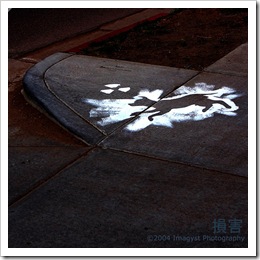 Collateral Reputation Damage® is damage done to an organization’s reputation when advocacy by individuals or groups who may or may not be associated with the organization is interpreted by stakeholders as being actions by the organization itself.
Collateral Reputation Damage® is damage done to an organization’s reputation when advocacy by individuals or groups who may or may not be associated with the organization is interpreted by stakeholders as being actions by the organization itself.
Image of Collateral Damage from Chet Provorse
Hurting the Organization isn’t the focus, but …
Using the term “collateral damage” emphasizes that the impact on the organization’s reputation is not the focus of the individuals who are taking action. Rather, the damage is an epiphenomenon, an incidental byproduct of some other activity, where the organization’s reputation is damaged through “guilt by association.”
Stakeholders, who assume that the organization is guilty of something they reject, diminish the reputation of the organization in their own estimation. Sometimes, these stakeholders work actively to tarnish the organization’s reputation in the estimation of others, through PR campaigns, boycotts, and other practices.
I got this idea from the phrase “Collateral Damage” which is used to describe unintentional damage to non-military people or property. (All those Iraqi civilians ? Collateral Damage.)
Collateral damage refers to: “[the] unintentional damage or incidental damage affecting facilities, equipment, or personnel, occurring as a result of military actions directed against targeted enemy forces or facilities. Such damage can occur to friendly, neutral, and even enemy forces. ”
Collateral Reputation Damage ® vs. Reputation squatting ®
Collateral Reputation Damage® is in a way the opposite of Reputation Squatting ® . Reputation squatting® occurs when an organization takes on some or all of the name of a better-known organization that has a positive reputation, when there is no actual relationship between the organizations. The intent is to use the organization’s name to imply a relationship, and thus free-ride on the benefits of the famous organization’s reputation. (The Princeton Review college-preparation business squats on the reputation of the prestigious Princeton University.)
Collateral Reputation Damage is often unfair.
Although there are some ways that damage to an organization can be unintentional and also appropriate, the term “Collateral Reputation Damage” should be reserved for times when the organization is most likely innocent, and thus undeserving of the damage.
Why do I have a ® symbol next to the term Collateral Reputation Damage®?
Hey, I’m still an academic. When I coin and develop a new, useful construct, I still want to have the idea linked to my name. So, go ahead- use the idea; just link back to the source.
 I am an organizational consultant, change advocate, and organizational identity/reputation scholar with a PhD in leadership & organizations. I research, write about, and consult with organizations on the relationships between organizational identity, actions, and purpose. I teach Technology Management, part-time, at Stevens Institute of Technology.
My current research focuses on how social technologies in the workplace can drive organizational change, generate meaning, and catalyze purpose. See the
I am an organizational consultant, change advocate, and organizational identity/reputation scholar with a PhD in leadership & organizations. I research, write about, and consult with organizations on the relationships between organizational identity, actions, and purpose. I teach Technology Management, part-time, at Stevens Institute of Technology.
My current research focuses on how social technologies in the workplace can drive organizational change, generate meaning, and catalyze purpose. See the 
{ 1 comment }
Hi webmaster, commenters and everybody else !!!?! The website was completely terrific! quite a bit of very good information and inspiration, equally of which we all utterly need!b Frequently ’em coming… you all do this kind massive event at this sort of Concepts… could not let how much I, for one appreciate all will need!
Comments on this entry are closed.